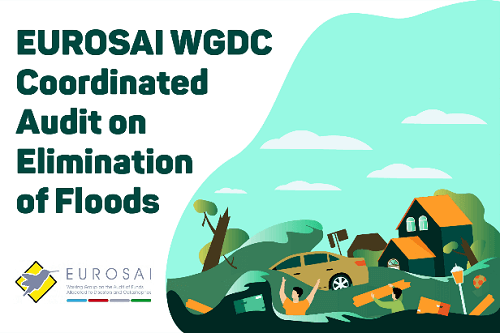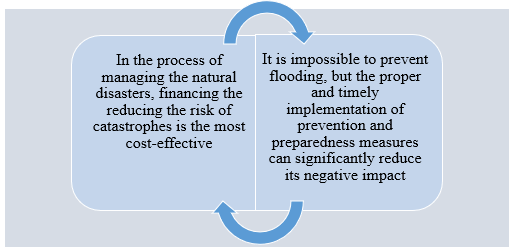The Coordinated Audit On The Prevention and Consequences Elimination of Floods
.png)
Background of the Cooperative Audit
This international coordinated audit was carried out as part of the activities of the EUROSAI Working Group on Audit of Funds Allocated to Disasters and Catastrophes.
The motivation for its conduction was the results of the Survey carried out in 2015 among the SAI–members and observers of the working group, which was the reason to include such audit in the work plan of the Working group for 2017–2020.
The Common Position on Cooperation within the International Coordinated Audit on the Prevention and Consequences Elimination of Floods signed by the SAIs of the Republic of Belarus, the Republic of Poland and Ukraine in 2017, at the 3rd Meeting of the EUROSAI Working Group in Rome, Italy.
Participants
6 SAI and European Court of Auditors participated in the joint audit.
- Belarus
- European Court of Auditors
- Georgia
- Poland
- Serbia
- Turkey
- Ukraine (Coordinator)

Participants of the international coordinated audit share the provisions of the INTOSAI Guidance GUID 9000 “Cooperative Audits between SAIs” and identify a decisive factor in cooperative efforts to find a common solution for a specific audit topic, as their countries have similar interests in sphere of flood prevention and its consequences elimination.
Period of time
The audit covers the period of 2016–2020.
Layout of the Joint Report on the results of the international coordinated audit has been prepared. It will be printed and sent to all members of the Working Group and the governing bodies of EUROSAI.
Audit type
Cooperative Audit with a single audit report in addition to the separate national reports.
Audit aim
Evaluation of productivity, efficiency and economy of the use of budgetary funds aimed at the creation, development and operation of flood forecasting and protection systems; and legality, timeliness and completeness of appropriate management decisions taken by the competent authorities.
The common idea
It is impossible to fully prevent flooding. However, the proper and timely implementation of preventive measures can significantly mitigate their harmful effects on the environment and save people’s lives.
Key findings of the international coordinated audit
- The legislative and regulatory framework governing the issues of flood protection, functioning of the system of flood risks assessment and management, water management, management of the system of prevention and elimination of the consequences of emergencies, including due to hydrological factors, in general, was formed.
- The auditors determined that a system of flood risk management based on the basin principle has been established and that district river basin management bodies have been appointed. At the same time, the national audits findings confirm that the competent authorities did not ensure adequate and comprehensive flood risk management.
- The audit found that flood protection measures have not been implemented effectively in most countries of participating SAIs.
- Auditors also concluded that system of financing of flood protection measures should be improved and does not meet the need for funds.
- Taking into account that due to climate change in the world and in Europe, in particular, the intensity and frequency of floods will increase and their harmful effects will be expanded, the auditors emphasize the need to ensure the adequate and accurate level of floods predictability. Spatial planning in flood risk management is one of the effective tools of flood risks management.


